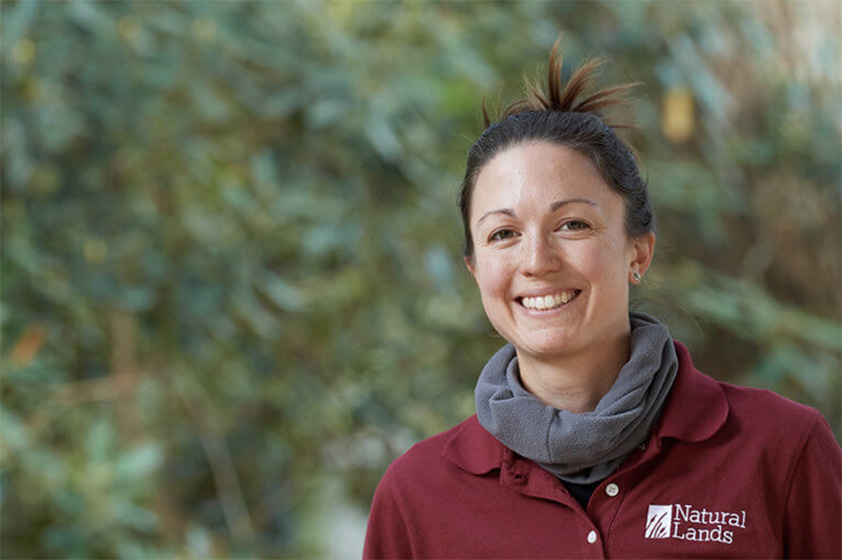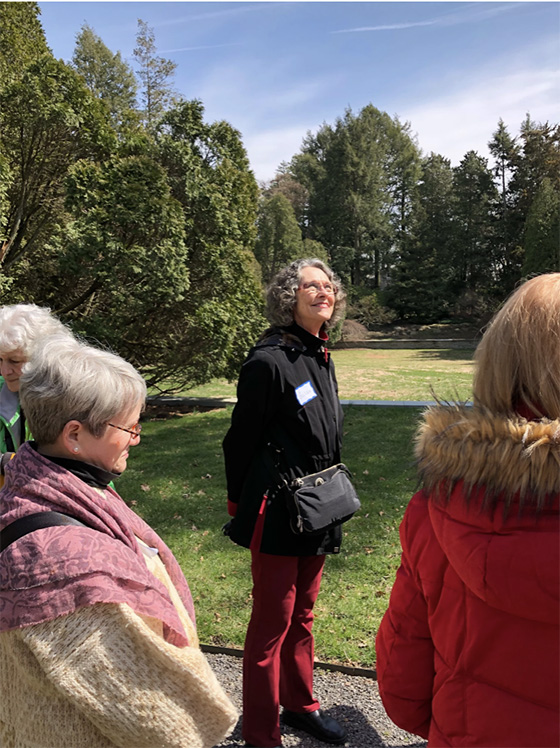Q&A with Laura Cruz
Stoneleigh, Philadelphia’s newest public garden, opened this past spring of 2018. We interviewed Laura, our tour guide for a springtime Cafe for Care Partners held at Stoneleigh, about her connection to the garden and to ARTZ Philly’s mission.

AP: What is your role at Stoneleigh and how did you become involved?
LC: I am one of 4 horticulturalists at Stoneleigh: A Natural Garden. In school, I studied psychology and landscape architecture, however, I never went on to work in landscape firm as a designer behind a desk. When I graduated from school I pursued hands on, outdoor experiences and work in the horticulture realm. I’m so happy I did. Eventually the path led me to Stoneleigh. This opportunity to work for Natural Lands and to work as part of a team in transitioning a former private estate into a public garden allows me to blend my love for the natural world, art/design and psychology.
AP: What does being outside in the gardens at Stoneleigh mean to you? What does it “give” you?
LC: I spent many hours of my childhood hiking with my family and playing in the woods. Because of those experiences, there is nowhere I feel more at home and comfortable than in nature. Working in a garden like Stoneleigh provides many of the same experiences I’d also have in a more wild place: the awe that results from looking up into the distant canopy of a giant tree and realizing how small I am in comparison, the calm that comes over me when I realize that traffic noise has been completely muffled by bird song, or the simple joy of smelling a tree’s fragrant blooms, being able to direct garden visitors to that tree and then experiencing their delight in that scent as well. I think that public gardens are a great intermediary between our indoor world and the wilderness, making experiences with nature accessible to our daily lives.
Working outside in the garden also teaches me constantly. It teaches me about hope (in the wintertime, when many trees lose their leaves and perennials die back to the ground it seems as though the landscape is dead, however, all that energy is just “asleep”, new leaves and buds are just waiting for warmth and sun of spring to reopen) , it teaches me patience (no matter how desperately I want that flower to bloom tomorrow or that new shrub to grow to full size, these plants will grow in their own time and I just have to wait), it teaches me how to nurture (I must take care to give each plant the water and nutrients it needs while it is in its container and be mindful of where to plant it in the ground so that the soil and light is right for it to thrive there long term), it teaches me the benefits of observation (the closer you look the more life you will see all around you; looking up close at the leaves or bark of a tree you will likely see many insects crawling, exploring, eating. If you observe patiently, you might be lucky enough to glimpse a bird swooping down to take one of those insects back to its nest to feed its young), and it teaches me about the cycles of life and death (as plants reach the end of their lives they become the nutrients that feed the future generations of plants in the garden).

AP: Can you tell me a little bit about your own relationship with dementia, in your own life?
LC: This part year my grandmother moved to a memory unit. I am trying to educate myself more about dementia; but it also scares me. I want to understand her experience. She has always loved gardening and art. I would like to find more ways to keep her exposed to those loves.
AP: You brought the idea of a program at Stoneleigh to us, at ARTZ Philadelphia. What inspired you to do that?
LC: My experience with my grandmother has made me think of the work that ARTZ Philadelphia is doing, bringing inspiration and richness to peoples’ lives through creative experiences. I think that both visual art and gardening are incredibly valuable forms of creative expression. The experiences that people have, for example, painting a canvas or viewing a piece of art, digging in the dirt or moving down a garden path, can be meaningful and restorative. Stoneleigh is one of the only public gardens in the Philadelphia region that is free of charge, so I think that makes it a uniquely accessible public space that people can easily visit again and again. I hope that ARTZ Philadelphia participants might consider visiting anytime to see what Stoneleigh can “give” to them.
Stoneleigh: a Natural Garden is undergoing a transition from a beloved family home to a public garden rich with native plants. Admission is free to all visitors who want to be a part of the journey! Learn more here. Image credit for photo of Laura Cruz: Ed Cunicelli.
